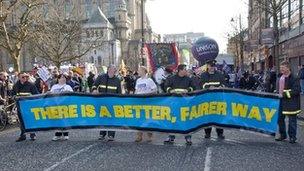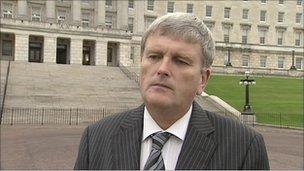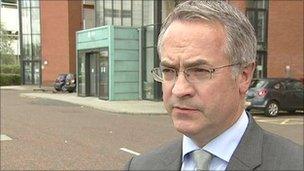The politics of striking
- Published

Those striking include workers in health, education, transport and the civil service.
According to Godwin's Law, any political debate online is never far away from a Nazi analogy.
So far as the attitude of Northern Ireland politicians to this week's public sector strike is concerned, a colourful phrase by the leading public-service trade unionist Bumper Graham is hard to beat.
He told BBC Radio Ulster that the ministers at Stormont like to give the impression they are opposed to Westminster cuts, yet so far their attitude has been less like the French resistance and more like the collaborationist Vichy regime.
The trade unionist's analysis may sting the Stormont parties, but it will hurt some more than others.
Nationalists, by and large, have been keen to stress their sympathy with the public sector strikers, whilst unionists have been far more critical of the likely disruptive impact of the one day protest.
The Northern Ireland Public Service Alliance (NIPSA) has asked MLAs not to cross their picket lines outside the assembly building.

Jim Wells was not happy about "jumping to the tune of the trade unions"
At a recent health committee meeting, the Sinn Fein chair Michelle Gildernew sought agreement to postpone a meeting to accommodate the unions' request. Nationalists immediately agreed, whilst the Alliance representative said he would prefer to reschedule the session at another stage.
The DUP vice-chair Jim Wells reported that his group weren't happy about "jumping to the tune of the trade unions".
However he added that, if from a practical point of view it proved impossible to get the necessary staffing or quorum, it would be farcical to go ahead.
Another unionist indicated they were not reluctant to cross a picket line, but didn't force the matter to a vote.
A contrasting example has been set by the Stormont employment and learning committee.
Nationalists pushed through a postponement of Wednesday's hearing. But that was overturned at a later committee meeting, with unionists turning out in force to ensure a strike day session will be held.
Struggle
The wider debate on the strike has mirrored these developments in the Stormont committee rooms.

Alex Attwood said NI workers should be exempt from any pension increase
The SDLP and Sinn Fein have engaged in a side struggle over which party is most sympathetic to the strikers.
The SDLP Environment Minister Alex Attwood complained that other Stormont ministers had not taken on board his suggestion that the Northern Ireland Local Government Scheme, which covers 44,000 workers, could and should be exempted from the UK wide pension increase.
Initially Sinn Fein appeared to treat this as another example of what Peter Robinson might label "fifth column" opposition from within.
But eventually Sinn Fein's John O'Dowd signalled his support for the proposal, which Mr Attwood argues mirrors a similar initiative in Scotland.
However at the time of writing the full Executive has yet to change tack on this score.
Sinn Fein, for its part, has drawn up proposals which would protect all public sector workers earning less than £32,000 from the pension increase.
This might be welcomed by some trade unionists, but not others as Sinn Fein plans to scrap the planned 3.2% hike for the less well paid by seeking enhanced contributions from those on higher pay bands.
The Irish National Teachers Organisation (INTO) says that whilst it appreciates the Sinn Fein Education Minister's commitment to low paid workers the proposal is a "non-runner".
The union argues that the plan would benefit less than 2,000 teachers out of a workforce of 19,000 and would break parity with the rest of the UK - something the local trade unions regard as important for the maintenance of the pay and pension conditions.
'Severe concerns'
In contrast with the nationalists, unionist politicians have been stressing the potential damage the action may cause to the economy.
The Ulster Unionist David McNarry indicated his opposition to what he described as a trade union attempt to "shut Stormont down".
The DUP's Alastair Ross estimated the damage to the economy at £500M, arguing that the strikes "will hit the most vulnerable people".
This is consistent with the DUP health minister Edwin Poots' previous criticism of October's one day strike, external by health workers.
After that action, Alastair Ross accused the trade unions of seeming "eager to take aggressive strike, even without the support of the majority of their members, rather than work constructively to resolve issues".
However, when asked whether the DUP is an anti-trade union party, the First Minister Peter Robinson adopted a more conciliatory tone.
He told the BBC he could understand the public sector unions' concerns about pensions and would not "degrade them" for taking action.
However, Mr Robinson said he had "severe concerns" over whether industrial action would make any difference and the unions would have been better advised to apply more pressure within their negotiations with the UK government.
The First Minister added that he had no intention of "carrying the can" for the UK government.
So the Stormont politicians are pulling in different directions. But whatever symbolic action they might take, they are likely to remain spectators to negotiations taking place on a wider cross UK basis.